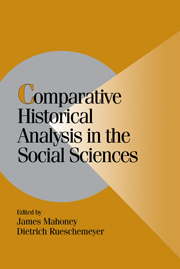Preface
Published online by Cambridge University Press: 05 June 2014
Summary
At the 1998 annual meetings of the American Political Science Association (APSA), David Collier and Paul Pierson convened a dinner meeting to discuss the field of comparative historical analysis. All participants that night were convinced that comparative historical research had made a fundamental contribution to contemporary social science. Yet they all recognized that over the past decade of rapid development and change in the field, scholars had devoted insufficient attention to writing programmatic statements about the substantive contributions, methodological strategies, and theoretical accomplishments of this body of work. The strong conclusion of the discussion was that such a programmatic statement was long overdue.
Upon returning to Brown University after this meeting, James Mahoney began discussions with Dietrich Rueschemeyer about the intellectual excitement surrounding comparative historical research within political science – discussions that ultimately led to the present volume.
From our vantage point in sociology, we sensed not only a similar enthusiasm for comparative historical analysis, but also a real need to take stock of the field as it currently stands. After all, it had been some fifteen years since the publication of the major commentaries that were still held up as defining the state of the art, such as Charles Tilly's As Sociology Meets History, Philip Abram's Historical Sociology, and Theda Skocpol's edited volume on Vision and Method in Historical Sociology.
- Type
- Chapter
- Information
- Comparative Historical Analysis in the Social Sciences , pp. xv - xxPublisher: Cambridge University PressPrint publication year: 2003



